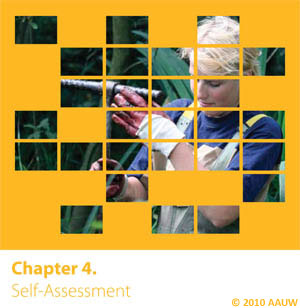


Stereotypes and Self-Assessments
Sociologist Shelley Correll explains that we use stereotypes as "cognitive crutches" in situations in which we do not know how to judge our performance. Research shows that even individuals who do not personally endorse beliefs that men are better than women at math are likely to be aware that these beliefs exist in the culture and expect that others will treat them according to these beliefs.
 This expectation, or what we think "most people" believe, has been shown to influence judgments. If a girl believes that most people, especially those in her immediate environment, think boys are better than girls at math, that thought is going to affect her, even if she doesn't believe it herself. Even if no one really believes that boys are better at math, the fact that a girl thinks they believe it is what matters. This is one reason that so many people found the 2005 comments of then-president of Harvard University Larry Summers to be so problematic. Because he spoke from such a powerful position, his remarks gave credibility to the stereotype that women may lack the aptitude to succeed in science, technology, engineering, and mathematics (STEM) fields.
This expectation, or what we think "most people" believe, has been shown to influence judgments. If a girl believes that most people, especially those in her immediate environment, think boys are better than girls at math, that thought is going to affect her, even if she doesn't believe it herself. Even if no one really believes that boys are better at math, the fact that a girl thinks they believe it is what matters. This is one reason that so many people found the 2005 comments of then-president of Harvard University Larry Summers to be so problematic. Because he spoke from such a powerful position, his remarks gave credibility to the stereotype that women may lack the aptitude to succeed in science, technology, engineering, and mathematics (STEM) fields.
According to Correll, educators can reduce students' reliance on stereotypes by making performance standards and expectations clear. The same letter or number grade on an assignment or exam might signal something different to girls than it does to boys. By using phrases like, "If you got above an 80 on this test, you are doing a great job in this class," teachers help students understand their grades so that students don't have to rely on stereotypes to create a standard for themselves. Thinking back to my engineering school days, I remember a number of times when the average test score was in the 50s or 60s. Getting test scores like that definitely increased my own uncertainty about whether or not engineering was for me. According to Correll, the more that teachers and professors can reduce uncertainty about students' performance, the less students will rely on stereotypes to assess themselves.

Hmcbride2000,
Thanks for sharing your experience. I wonder how many men today would say that "everybody knows" that men are better at science. I think a lot of people still think this - whether consciously or not - but I hope things have changed at least to the point where people are less likely to SAY it outright. A step in the right direction, at least.
Best,
Christi
I can certainly see this happening. People will fill a vacuum with whatever information they have on hand. And the fix seems reasonable and simple. Thinking back to my own exams where a 50 was the high score (which I received in that class), I recall the men just assuming no one did well on the test because their scores were so low. Whereas the women automatically reflected that we must not have done well. Having a professor put the scores and expectations in perspective was certainly helpful in that context.
I can't say it would have helped the after discussion however. Once it was clear that the women had all 5 of the top scores in the class, the men simply responded that the test must have been "biased" as "everybody knows" men are better in science...right...















